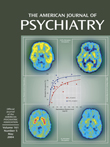To the Editor: Mark Olfson, M.D., M.P.H., et al.
(1) found that treatment rates for attention deficit hyperactivity disorder (ADHD) in the United States were lower for black children than for white children (1.7% versus 4.4% in 1997). Of interest, in the United Kingdom, a nationwide epidemiological study found a lower prevalence of ADHD in black than white children (0.4% versus 1.6%)
(2). Despite differences in methods, both studies show similar variations across ethnic groups.
One possibility is that such differences reflect financial inequalities, e.g., that poorer black families in both countries are unable to afford or access services so that black children are underdiagnosed and undertreated. According to this hypothesis, one would expect a low prevalence and treatment rate for children in low-income families as well as for black children. This is unlikely for several reasons. First, in the United Kingdom, ADHD is more prevalent in children of low-income families but less prevalent among black children. Second, the significant increase in the rate of treatment for low-income families in the United States has not been matched by a corresponding increase in treatment rates for black children. Third, difficulties accessing services should not have affected diagnoses in the British study, which involved interviews with children and parents and mailed questionnaires for teachers, regardless of whether they had had any contact with services.
Dr. Olfson et al. rightly suggest that cultural factors may explain the ethnic variation without exploring the possibilities in detail
(1). Could misdiagnosis account for the differences? In the absence of laboratory investigations, ADHD remains a clinical diagnosis. In clinical practice as well as epidemiological studies, rating scales are commonly employed to aid diagnosis. Such scales rely on value judgments by respondents, usually teachers and parents, as to whether a child is felt to be excessively impulsive, inattentive, etc., compared to other children of the same developmental stage or cultural group. These scales carry the reassuring air of scientific objectivity, but overreliance on their results leads to value judgments being treated as statements of fact.
Following this hypothesis, one might conclude that physicians, teachers, and families show a more enlightened tolerance of behavioral disturbance in black children, who are thus spared an inappropriate label of ADHD. Sadly, the British data do not support such a hypothesis. The overall rate of mental disorder in black children was higher than in any other ethnic group, with conduct disorder making the biggest contribution to the difference
(2). Are we therefore more likely to attribute behavioral disturbances to ADHD in whites and to conduct disorder in blacks? Given the less-certain illness status of conduct disorder, this reveals important differences in our attitudes toward personal responsibility and treatability in different ethnic groups: in short, that black is bad and white is mad.

